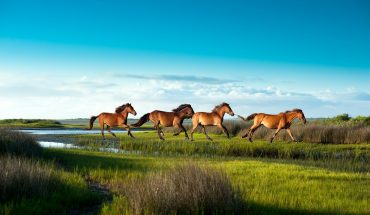by Samantha Thompson Hatem
The International Bluegrass Music Association and its members arrive in late September for the group’s annual conference, when they’ll turn downtown Raleigh into a bluegrass mecca with more than 150 bands, a street festival, and big-name musicians like Alison Krauss, Steve Martin and Edie Brickell.
“It’s a big deal for Raleigh and for bluegrass music around here,” says Tim Woodall, of local bluegrass band The Grass Cats.
The schedule, from Sept. 24-28, is packed. Think Hopscotch, that ever-popular, eclectic downtown music festival, but with more banjos and mandolins, and the chance to learn to fiddle or contra dance along the way. Organizers expect at least 30,000 people a day during the weekend street festival and an estimated $10-million boost for the local economy.
“Everyone will be able to find something they can connect with,” says Lynda Dawson, the singer/songwriter for Raleigh-based Kickin Grass Band, one of several local bands on the slate. She says even if you don’t like bluegrass – or think you don’t like bluegrass – there’s something for you: jazzy bluegrass, classical bluegrass, Americana, acoustical fusion.
It all kicks off Sept. 24 with the actual IBMA conference, which includes workshops on anything from grant writing to performing abroad. If you want to start a bluegrass band, meet with a music label, or learn the ropes of the business, this is your thing. “A lot of networking and business will be getting done early in the week,” says William Lewis, executive director of PineCone, the Piedmont Council of Traditional Music, which is helping organize events. Then the industry will honor its best at an awards show on Sept. 26, hosted by Grammy Award-winners Steep Canyon Rangers, who hail from Brevard.
But it’s the music that’s the real draw. Downtown Raleigh bars and clubs, including Kings, the Pour House, and Lincoln Theatre, will be taken over by bluegrass bands as part of the Bluegrass Ramble. Then there’s the two-day Wide Open Bluegrass Festival, coinciding with more music at Red Hat Amphitheatre, where many of the big-name performers will play.
All together, “this has the potential to be one of the biggest bluegrass festivals in the Southeast,” Lewis says.
And with the theory that nothing goes with bluegrass quite like barbecue, a whole-hog barbecue cook-off will make Fayetteville Street particularly aromatic Friday night; judging’s planned for noon on Saturday. (See Gigs on p. 60 to meet the whole hog competition’s diminutive rules enforcer.)
Right place, right time
How did the City of Oaks end up with the bluegrass industry’s annual pilgrimage?
Raleigh bid on the event three years ago but at the time didn’t have the facilities to snag the conference from Nashville. Red Hat Amphitheatre helped tip the balance. Still, it took more than facilities to sell Raleigh. It was the state’s rich bluegrass connection – from its storied history, particularly the early years – to the built-in fan base of bluegrass music lovers.
“When you look at current bluegrass bands or even past bluegrass bands, so many of the great players are from North Carolina,” said Daniel Routh of the Raleigh-based bluegrass band Nu-Blu.
North Carolina native Scruggs is one of the biggest stars of the state’s bluegrass story. “He set the standard for bluegrass banjo and helped define the bluegrass sound with his three-finger picking,” says PineCone’s Lewis.
Scruggs was a member of the Blue Grass Boys, a band formed by Bill Monroe, whom many credit as the grandfather of bluegrass. The story goes that Monroe and his brother Charlie, then known as the Monroe Brothers, were in Raleigh at WPTF radio station when they split, which eventually lead Bill Monroe to form the Blue Grass Boys.
Scruggs later hooked up with guitarist Lester Flatt to form the Foggy Mountain boys, the landmark band showcased on The Lester Flatt and Earl Scruggs Grand Old Opry Show.
“This event provides an opportunity to let people know that North Carolina is an important breeding ground for bluegrass music,” Lewis says.
Chatham County Line
There are four things you can count on when you see the bluegrass band Chatham County Line in concert.
They always wear suits and ties. They’re always crowded around one microphone to sing. Their instruments usually are unplugged. And they always fly the North Carolina flag behind them on stage.
Even without those signatures, though, the Raleigh-based foursome is likely one of the area’s most recognizable bluegrass bands. Together since 1999, they’ve worn out buses and neckties playing traditional and original Americana and bluegrass songs at sold-out shows around the globe, including more than a dozen tours in Europe.
From the beginning, “everyone enjoyed how we worked together and how we got along,” says John Teer, who plays fiddle and mandolin.
Mutual admiration seems to have brought together the four of them – Teer, 36; frontman and songwriter Dave Wilson, 38; banjo player Chandler Holt, 36; and bassist Greg Readling, 42. Early on, when they all weren’t busy with other bands, they’d play at Sadlack’s or Boo’s Hideway in Raleigh, finding what would become their take on bluegrass by mixing a variety of other genres with the spirit of bluegrass.
“We enjoyed playing music together,” Wilson said. “And it started to become more than a side project for us.”
That led them all to put aside their other bands and focus on CCL. Together they played original songs, mostly written by Wilson, and put a rock ’n’ roll spin on bluegrass favorites. At first, they were the opening act for Tift Merritt. It was during one of those shows that local record producer Chris Stamey saw them and helped them land a record deal.
The band’s name is really about what you might think: the Chatham County line. They were driving to practice at Holt’s house in Orange County early on in the band’s history when Teer and Wilson got lost and drove over the Chatham County line three times. “We had a gig and we needed a name,” Wilson explained. It stuck. “And we never looked back.”
That kind of straightforward approach applies to those suits and ties, too. “It’s not like we’re trying to be hokey with it,” Teer said. “We respect the music, and we respect the audience.”
CCL has now recorded six albums – all immensely popular in Europe – the last of which was a best-of album called Sight & Sound recorded (and filmed) at Fletcher Opera Theatre in summer 2012. The last album with original songs was Wildwood in 2010; this is the longest stretch CCL has had without new music, something the band worked on this summer.
Local fans can expect a new album next year, but before then they’ll have two chances this month to see CCL live, at Hopscotch Music Festival Sept. 5 and then again during World of Bluegrass in late September.
“We just want to continue putting out good records and good songs,” Wilson says.
Kickin Grass
The biggest compliment the Kickin Grass Band regularly gets is a backhanded one: I didn’t think I liked bluegrass music, but I love you guys.
Band members think it’s the combination of original lyrics, contemporary and old-time bluegrass, and their stagecraft that turns naysayers into followers. “We put on a show rather than just playing songs,” says bassist Patrick Walsh.
The Raleigh-based band is known as one of the hardest-working bluegrass/Americana groups out there, and as if to prove the point, they’re scheduled to play at least five times during the World of Bluegrass festival. But don’t go expecting traditional bluegrass twang. “We’re not your grandfather’s bluegrass band,” says the band’s mandolin player, Jamie Dawson.
The band has been tweaking its sound since 2001, when bassist Patrick Walsh started the band to play for a dance troupe, the Apple Chill Cloggers. Back then, the band was a hodgepodge of members who teamed up to play gigs. The next year, things gelled when he met the husband-and-wife duo Jamie and Lynda Dawson. Jamie played mandolin. Lynda brought her voice, guitar playing and songwriting ability.
And with that, the band branched out to make a name for itself, including winning best band in Raleigh at a competition at the Hibernian Pub in 2003 – after dueling it out with traditional rock ’n’ roll and even death-metal bands.
The prize was $2,000, enough to record their first album.
The band members, all now in their 30s and 40s, then went on the road, saying “yes” as often as they could, racking up nearly 120 shows in a year playing bluegrass festivals and clubs while still holding down day jobs: Jamie Dawson is in real estate; Walsh does cabinetry and runs a farm.
By their third album, the members gave themselves permission to record songs they way thought they should sound, Lynda Dawson said. “We were true to who we are and what we are passionate about.”
It was a turning point that helped them find their niche among bluegrass fans. “We were playing for us, and the fans responded to it,” Jamie Dawson said.
“People embraced us.”
Just when everything seemed to moving in the right direction for the band, it all came to a near standstill. Walsh’s wife became sick with cancer and later died. Around the same time, Lynda Dawson became pregnant with a daughter. Faced with the realities of life’s joys and heartbreak, the band slowed down.
Lynda Dawson said to help deal with her sadness about losing her friend and the anticipation of her new baby, she put her energy into writing honest songs. At the same time, the band lost a member to another band, and later welcomed fiddler Pattie Hopkins and banjo player Hank Smith.
The band reemerged last summer stronger with a fourth album, Walk with Me, which received the best reviews yet, as well as international air play. And in July, they released a fifth album, a collection of their best music, played live at their 10th-anniversary show last summer.
“If we stopped playing today, I think I’d be satisfied with everything we’ve accomplished,” Jamie Dawson says. “But I think there’s a lot more we can do.”
The Grass Cats
The Grass Cats is one of those local bands that could be a professional touring band – if it wanted to.
But despite three No. 1 hits and eight albums, the five Cats have opted to keep their day jobs and spend their nights and weekends doing what they love most: playing a mix of traditional and original bluegrass music.
“This is like our golf,” says Tim Woodall, 61, the band’s bassist, who is an industrial salesman by day. “This is our hobby.”
Hobby or not, if there’s a sound that captures the spirit of the upcoming World of Bluegrass festival, it might well be The Grass Cats’. When the International Bluegrass Music Association joined Raleigh Mayor Nancy McFarlane in May to announce that Raleigh had landed IBMA’s festival and conference, it was The Grass Cats who played.
William Lewis, executive director of PineCone, the Piedmont Council of Traditional Music, which is helping organize events, said the band was a natural fit. “They’re local, they’re engaged.”
The Grass Cats’ first gig was not glamorous: the 1997 grand opening of a Southern Pines garden center. But word got out, and next thing they knew, they were playing 60 to 70 shows a year – saying “yes” as often as their day jobs would allow.
Woodall says the band’s appeal is its ability to please a lot of people. “We play such a wide variety of venues, from clubs, to pig pickin’s, to corporate events – we have to adjust and play a little of everything for everyone,” including covers.
But it’s their original work that gets them nods from true bluegrass fans. Much of the credit for the original work goes to songwriter Russell Johnson, 50, an original Grass Cats member and record producer, whose hits have included the No. 1 singles Bluegrass Man and A Good Way to Get the Blues.
Those hits have brought the band national attention. But because of those day jobs, they mostly stick to North Carolina gigs, taking trips to Virginia or New York a few times a year.
If you miss The Grass Cats – including fiddler Chris Hill (the third original band member who works for the Town of Kinston), Rick Lefleur (who spends days as an engineer and nights on banjo and vocals), and Alan Mullen, 46 (who works in IT and on guitar) – during World of Bluegrass, don’t worry. They have a standing date the first Thursday of every month at Mac’s Tavern in Cary. It’s a steady gig, one they haven’t missed since they started playing there in 2000.
“It’s a place for us to play every month, a paid practice for us,” Woodall said. “Plus there’s no cover charge, and it’s good food and three hours of live bluegrass.”
Nu-Blu
Raleigh-based bluegrass band Nu-Blu was busier than ever this summer. With a new album to promote and a seven-week bus tour of festivals and concert halls around the country, the quartet put in long miles.
It’s what they’ve wanted for a long time. Nu-Blu formed in 2003, just after Daniel and Carolyn Routh’s separate bands fell apart. “We were really just best friends, so we said, ‘Why don’t we start a bluegrass band?’” Daniel Routh recalls.
Then they got waylaid. Carolyn, 46, suffered two strokes, and spent the next year working to regain speech and movement on her right side. It turned out that music was just the therapy she needed. “It gave her something to strive for,” says Daniel Routh, 36. At that point, the pair decided to make it a full-time gig.
Then they spent eight years touring and charting with bluegrass and gospel songs when they realized they were at a turning point: They had to stay regional, or go big. “Going big” means they’ll play 100 shows this year, with even more booked next year. “That’s really what we want to be, no less than 120 shows a year,” Routh says.
To celebrate a decade that almost didn’t happen, the band this summer released the digital album Ten with songs about love, loss, life on the road and family. That’s on the heels of last year’s album, their third: Nail By Nail, which features gospel songs with a mix of bluegrass and acoustic country.
While Daniel and Carolyn share vocals, they’re joined by long-time band members Austin Koerner, 22, on mandolin and Levi Austin, 22, on banjo. “We have a unique dynamic, not just within the music but also personally,” Daniel Routh says. “Our personalities really balance out really well. They have to, to be able to get along on a bus for seven weeks.”
They play songs that they have an emotional attachment to, not necessarily because they’re bluegrass.
“It’s a sound that you can definitely tell that it has roots in bluegrass, but at the same time, depending on the song that we do, it’s almost genreless,” he said. “We do something that may be very driving and hardcore and traditional, and the next song we do is very much not traditional, maybe not even bluegrass.”
For the band, a good song is a good song. “It doesn’t matter what the genre is,” Daniel Routh says. “We just enjoy playing good music.”
Fans can see Nu-Blu Sept. 28 at Wide Open Bluegrass on the Raleigh Convention Center stage.
For tickets and more information about World of Bluegrass festival, including a full performance schedule, go to bluegrassfanfest.org. For non-IBMA members, single-day general admission tickets are $50; single-day reserved tickets are $70.







